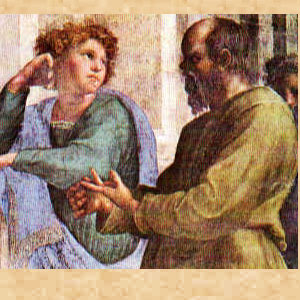Last week I began teaching a philosophy course at Moraine Valley Community College on the Southside of Chicago. The course is PHIL 111: Critical Thinking, a topic that never ceases to amaze and, at times, perplex and challenge my assumptions about what it means to be human.
As a philosophy student, I was always struck by Aristotle’s description of human nature: we are the rational animal. But the more we analyze ourselves, the more we explore our capacities and limitations as a species, the more we discover that rational thinking is the exception, and not the norm…Far, far from it apparently. Neurologists, anthropologists, and evolutionary psychologists have all made convincing arguments that the human brain, and the thought patterns it tends to produce, evolved not to pursue logical explanations and objective evidence, but to concoct self-serving, self-justifying theories about how the world works. Why let objective facts and explanations ruin a good, wish-fulfilling story, right?
This is because the deluded, biased explanations serve a more fundamental purpose: survival. There’s an adaptive advantage to spinning yarns and fabricating facts that, though divorced from the realm of reason and objectivity, nevertheless reduce stress and anxiety, making the world a seemingly more sensible, human-friendly place and building our confidence.
For over fifty years, social psychologists have been exploring this capacity for mendacity. The theory of Cognitive Dissonance accounts for our need to justify core beliefs and behaviors. To justify them at almost any cost. Cognitive Dissonance is the uneasy, sometimes terrified, sometimes enraged, feeling you get when an event or a person challenges or threatens your beliefs. It was first proposed by Leon Festinger in the 1950s, the product of research into a doomsday UFO cult. Chronicled in the book When Prophecy Fails, Festinger and his colleagues wondered what cult members would do when the mothership didn’t come and whisk them away to another planet. How would these so-called rational animals behave then? So, did the cult members adjust their beliefs? Did they discard their delusions and wake up to reality? What Festinger found was that cult members actually doubled-down on their beliefs and tended to become more invested in the cult’s bizarre mythology. Instead of critically analyzing why they were so deluded, they used their powers of reason to recalculate the arrival of the mothership. They kept on believing. They were just too committed to back out and admit the truth.
Now you might say: that sounds about right. After all, they were UFO cult members. Shouldn’t we expect them to act that way? But Festinger and his student Elliot Aronson found cognitive dissonance to be a universal human trait. When confronted with contradictory and disturbing information, ideas and facts that threaten our core beliefs, we all put our creative mental powers to work defending those beliefs. And what is the most essential idea we are dying to protect? The most fragile one of all: the idea we have of ourselves as intelligent, well-meaning, competent people. Whether it’s smokers, music downloaders, cheaters, whatever the sin or vice, it’s so easy to come up with a story that makes your sin or vice or moment of incompetence sound like the most reasonable, ethical thing in the world. In other words, self-justification and esteem needs trump the desire for transcendent truth.
That’s why I love teaching critical thinking. That’s why we have to teach it. It doesn’t come naturally. The first step is to overcome cognitive dissonance, put your own ego in check, and really engage in that Socratic call to examine life. Critical thinkers listen to the buzzing inner-gadfly of skepticism and curiosity. Only then can a human being emerge from the muck of deluded, self-serving thoughts, shake off the slime, and become the clear-headed, rational animal Aristotle challenged us to be. Otherwise, we are, as Aronson pointed out, merely rationalizing animals. That’s what comes naturally. Thanks to evolution, I get to make a living teaching others, and myself, how to immunize the mind from the virus of irrationality.
If you’re interested in the topic, too, I suggest checking out Aronson’s and his colleague Carol Tavris’ work on cognitive dissonance. What are your thoughts on rationality? Do you agree or disagree with cognitive dissonance theory? Why? What would Socrates ask?



